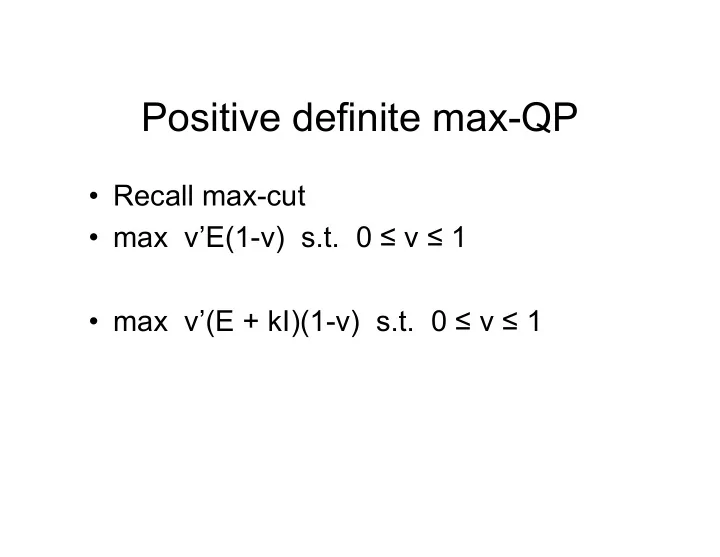

Positive definite max-QP • Recall max-cut • max v’E(1-v) s.t. 0 ≤ v ≤ 1 • max v’(E + kI)(1-v) s.t. 0 ≤ v ≤ 1
LASSO revisited
LASSO objective terms
Support vector machines
Maximizing margin • margin = y i (x i . w - b) • max s.t.
Administrative • Submission directories should be present now. /afs/andrew/course/10/725/Submit/ your-ID Check yours! – e.g., submit a small file “test.txt” • We don’t want to hear about problems late on night before due date… • Registration deadline: yesterday – everyone’s in! – to audit: register + get signed form + turn in to HUB – I still have one signed form
Duality
What if we’re lazy • A “hard” LP: min x + y s.t. x + y ≥ 2 x, y ≥ 0
OK, we got lucky • What if it were: min x + 3y s.t. x + y ≥ 2 x, y ≥ 0
How general is this? • What if it were: min px + qy s.t. x + y ≥ 2 x, y ≥ 0
Let’s do it again • Note ≤ constraint min x – 2y s.t. x + y ≥ 2 x, y ≥ 0 x, y ≤ 3
And again • Note = constraint min x – 2y s.t. x + y ≥ 2 x, y ≥ 0 3x + y = 2
Summary of LP duality • Use multipliers to write combined constraints ≥ ≤ = • Constrain multipliers to give us a bound on objective • Optimize to get tightest bound
min x + y s.t. x + y ≥ 2 The Lagrangian x, y ≥ 0 • L(a,b,c,x,y) = [x + y] – [a (x + y – 2) + bx + cy] • min x,y max a,b,c ≥ 0 L(a,b,c,x,y)
min x + y s.t. x + y ≥ 2 Lagrangian cont’d x, y ≥ 0 • L(a,b,c,x,y) = [x + y] – [a (x + y – 2) + bx + cy] • min x,y max a,b,c ≥ 0 L(a,b,c,x,y)
Saddle-point picture • min y s.t. y ≥ 2
Example: max flow • Given a directed graph – edges (i,j) ∈ E – flows f ij , capacities c ij – source s, terminal t (c ts = ∞ ) • max f ts s.t. – positive flow – capacity – flow conservation
Dual of max flow
Interpreting dual
min cut: image segmentation
What about QP duality? • min x 2 + y 2 s.t. x + 2y ≥ 2 x, y ≥ 0 • How can we lower-bound OPT?
Works at other points too • min x 2 + y 2 s.t. x + 2y ≥ 2 x, y ≥ 0 • Try Taylor @ (x, y) = (v, w)
Example: SVMs
SVM duality • Recall: min s.t. • Taylor bound objective: • Generic constraint: • To get bound, need:
SVM dual • max α ,v Σ i α i – ||v|| 2 /2 s.t. Σ i α i y i = 0 Σ i α i y i x ij = v j for all j α i ≥ 0 for all i
Perpendicular bisector
Recommend
More recommend